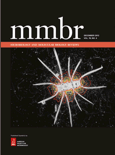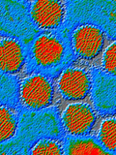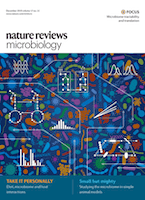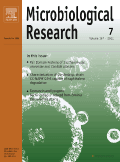
Microbiome
metrics 2024
Advancing Knowledge in Microbial Interactions
Introduction
Microbiome, published by BMC, is a leading open access journal established in 2013 that focuses on the intricacies of microbiological research. With an impressive impact factor and consistently ranking in the Q1 category in both Microbiology and Medical Microbiology, this journal serves as a pivotal platform for researchers, professionals, and students who are eager to explore the dynamic role of microbiomes in health and disease. With an ISSN and E-ISSN of 2049-2618, accessible from the United Kingdom, this journal encourages the dissemination of pioneering findings and facilitates collaboration. Its Scopus rankings place it among the top tier in its discipline, reflecting its commitment to advancing knowledge in microbiomics and its applications in medicine. As a vital resource for advancing scientific inquiry, Microbiome provides a forum for innovative research that drives the field forward, fostering understanding and solutions that impact diverse areas from ecology to therapeutics.
Metrics 2024
 3.80
3.80 13.80
13.80 17.90
17.90 143
143Metrics History
Rank 2024
Scopus
IF (Web Of Science)
JCI (Web Of Science)
Quartile History
Similar Journals

Advancements of Microbiology
Driving Progress in Microbial UnderstandingAdvancements of Microbiology, published by the Polish Society of Microbiologists, serves as a vital resource for researchers and professionals in the field of microbiology. With an ISSN of 0079-4252 and an E-ISSN of 2545-3149, this esteemed journal provides Open Access content, facilitating the dissemination of innovative scientific research since 2018. Although coverage in Scopus has been discontinued since 2018, the journal is recognized for its historical contributions, ranging from 1973 to 1982 and 1999 to 2018. Positioned within the Microbiology (medical) category, it currently ranks #97 out of 110, while its standing in Immunology and Microbiology reflects a rank of #127 among 140 journals. Advancements of Microbiology emphasizes cutting-edge findings and applications, catering to an audience dedicated to advancing knowledge and practice in the ever-evolving microbiological landscape.

Nature Microbiology
Transforming Insights into Impactful DiscoveriesNature Microbiology is a premier journal published by NATURE PORTFOLIO that has firmly established itself within the realms of microbiological research since its inception in 2016. Based in the United Kingdom, this prestigious journal specializes in the intricacies of applied microbiology, cell biology, genetics, immunology, and medical microbiology, making it a cornerstone for academics and professionals alike. With an impressive Scopus ranking placing it in the top tier across various relevant categories—such as rank #3 in Genetics and #2 in Applied Microbiology—it underscores the journal’s commitment to high-quality, impactful research. Although it operates under a subscription model, Nature Microbiology's broad Open Access policy facilitates greater dissemination and visibility for its authors. The journal's objectives are centered around publishing cutting-edge advancements that enhance our understanding of microbial life, its interactions, and applications in health and disease. As a Q1 journal across multiple disciplines, it holds immense significance for researchers, professionals, and students enthusiastic about the latest innovations and breakthroughs in microbiology.

MICROBIOLOGY AND MOLECULAR BIOLOGY REVIEWS
Connecting Research and Discovery in Microbiology and Molecular BiologyMICROBIOLOGY AND MOLECULAR BIOLOGY REVIEWS, published by the American Society for Microbiology, is a premier journal dedicated to advancing the fields of microbiology and molecular biology. With an impressive impact factor reflective of its Q1 ranking in categories such as Immunology, Infectious Diseases, and Molecular Biology, this journal consistently showcases high-quality, peer-reviewed articles that contribute to the current understanding of microbial life and molecular mechanisms. Operating since 1997, the journal aims to bridge the gap between microbiological methods and molecular biology applications, making it an essential resource for researchers, professionals, and students alike. Readers can access content through various platforms, ensuring that the latest findings are readily available to the scientific community. With its esteemed reputation, MICROBIOLOGY AND MOLECULAR BIOLOGY REVIEWS remains a leading voice in the exploration of the life sciences, catering to a broad audience deeply invested in unraveling the complexities of microbial and molecular systems.

Current Research in Microbial Sciences
Empowering Scientific Collaboration in Microbial ResearchCurrent Research in Microbial Sciences is a distinguished peer-reviewed journal published by Elsevier, focusing on the dynamic and rapidly advancing fields of microbiology and infectious diseases. With an ISSN of 2666-5174, this journal has established itself as an essential resource for researchers, professionals, and students alike, offering the latest findings and insights from 2020 to 2024. The journal holds a significant position in the academic landscape, achieving a Q2 ranking across multiple categories, including Immunology and Microbiology, Infectious Diseases, and Medical Microbiology, demonstrating its impact in these critical areas of study. With impressive Scopus rankings—such as being placed in the 94th percentile for Immunology and Microbiology—current research is well-supported by a thriving scientific community. Although the journal is not open access, it serves as a vital platform for disseminating high-quality research and fostering collaboration within the microbial sciences. Engaging with this journal enables professionals and researchers to stay abreast of innovations and contribute to the collective body of knowledge that shapes our understanding of microbial interactions and infectious diseases.

INTERNATIONAL JOURNAL OF MEDICAL MICROBIOLOGY
Transforming Microbiology into Actionable Health SolutionsWelcome to the International Journal of Medical Microbiology, a leading publication in the field of microbiological research and infectious diseases, offered by Elsevier GmbH. Established in 2000, this esteemed journal provides a scholarly platform for the presentation of high-quality research, reviews, and innovations that bridge medical microbiology and clinical applications. With an impressive impact factor positioning it within the Q1 category across multiple disciplines, including Infectious Diseases, Microbiology, and Medicine, the journal is recognized for its rigorous peer-review process and significant contributions to advancing our understanding of microbial pathogenesis, diagnostics, and therapeutics. The International Journal of Medical Microbiology is committed to open access, promoting the dissemination of knowledge and accessibility for researchers, professionals, and students worldwide. Based in Munich, Germany, the journal continues to play a vital role in the global scientific community, fostering collaborations and inspiring future innovations in the fight against infectious diseases.

Annual Review of Microbiology
Exploring the Frontiers of Microbial Science with AuthorityAnnual Review of Microbiology is a preeminent academic journal published by Annual Reviews, specializing in the dynamic field of microbiology. With a rich history dating back to 1948, this journal has become a vital resource for researchers, professionals, and students alike, providing comprehensive reviews that synthesize the latest advancements and trends in microbiological research. The journal is renowned for its impressive reputation, holding a Q1 ranking in both Medicine (miscellaneous) and Microbiology, and achieving an outstanding Scopus rank of #12 out of 182 in the field, placing it in the 93rd percentile. Although it does not offer open access, the Annual Review of Microbiology remains integral to advancing knowledge and understanding of microbial science, helping to bridge the gap between fundamental research and practical applications in health, industry, and environmental sustainability. Its meticulously curated content serves as a crucial platform for fostering innovation and collaboration among the global research community.

Microbiology Research
Innovating Insights in Microbiology ResearchMicrobiology Research, published by MDPI, stands as a pivotal open-access journal in the field of microbiology, having established its presence since 2010. Based in Switzerland, this journal strives to provide a platform for innovative research and cutting-edge findings in various branches of microbiology, including medical microbiology and molecular biology. With an impact factor that reflects its dedication to scholarly excellence, Microbiology Research is classified in the Q3 category for both microbiology and medical microbiology, and Q4 for molecular biology as of 2023, indicating its growing importance and outreach within these domains. The journal aims to foster discussion and collaboration among researchers, professionals, and students by presenting articles that cover a wide array of topics and methodologies in microbiological research. Leveraging its open-access model, Microbiology Research ensures that high-quality research is accessible to a global audience, thus facilitating the advancement of knowledge and innovation in the microbial sciences.

mSphere
Pioneering research at the intersection of microbiology and molecular biology.mSphere is a leading open-access journal published by the American Society for Microbiology, dedicated to the dynamic fields of Microbiology and Molecular Biology. Since its inception in 2016, mSphere has rapidly established itself as a reputable source of scholarly research, achieving notable impact factors and excellence within the academic community. The journal ranks in the top quartile (Q1) amongst its peers in Microbiology, and Q2 in the field of Molecular Biology, demonstrating its significance and relevance through Scopus rankings—specifically, it holds the #42 spot out of 182 in the Microbiology category and #108 out of 410 in Molecular Biology. With an editorial commitment to advancing the understanding of microbial and molecular sciences, mSphere provides an accessible platform for researchers, professionals, and students alike to disseminate groundbreaking findings. The journal promotes rigorous peer-review and invites innovative contributions aimed at enhancing microbial research mobility and molecular exploration. Accessible openly since 2016, mSphere continues to thrive as an influential publication driving scientific dialogue and discovery in the microbiological sciences.

NATURE REVIEWS MICROBIOLOGY
Illuminating the Complexities of Microbial LifeNATURE REVIEWS MICROBIOLOGY, published by NATURE PORTFOLIO, stands as a leading journal in the field of microbiology, distinguished by its Q1 ranking in multiple categories, including Immunology, Infectious Diseases, and Microbiology for 2023. With an impressive niche impact factor, this journal serves as a vital resource for researchers, professionals, and students seeking comprehensive and cutting-edge reviews on various aspects of microbiology and immunology. Operating from the United Kingdom, the journal covers a wide range of topics reflecting the rapid advancements in the field, while maintaining rigorous editorial standards. Although it does not offer open access, the journal’s articles are essential for anyone aiming to stay at the forefront of microbial research and infectious disease studies. Established in 2003, it continues to thrive as a premier source of knowledge, offering critical insights into ongoing microbial challenges and innovations in research, thereby contributing significantly to our understanding of microbiological complexities.

MICROBIOLOGICAL RESEARCH
Exploring the Depths of Microbial InnovationMICROBIOLOGICAL RESEARCH, published by Elsevier GmbH, serves as a leading platform for advancements in the field of Microbiology, holding an impressive Q1 ranking in its category as of 2023. With an ISSN of 0944-5013 and E-ISSN 1618-0623, this journal has been instrumental in disseminating high-quality research since its inception in 1994 and continues to contribute significantly to the academic landscape through 2024. Positioned within the top 13% of publications in the Immunology and Microbiology category, ranked #24 out of 182 according to Scopus, it attracts the attention of researchers, professionals, and students alike. While the journal is not open access, it offers vital insights and peer-reviewed articles that drive innovation and exploration within microbiological research. Its rigorous selection process underscores the importance of quality and relevance in advancing knowledge in this dynamic field.